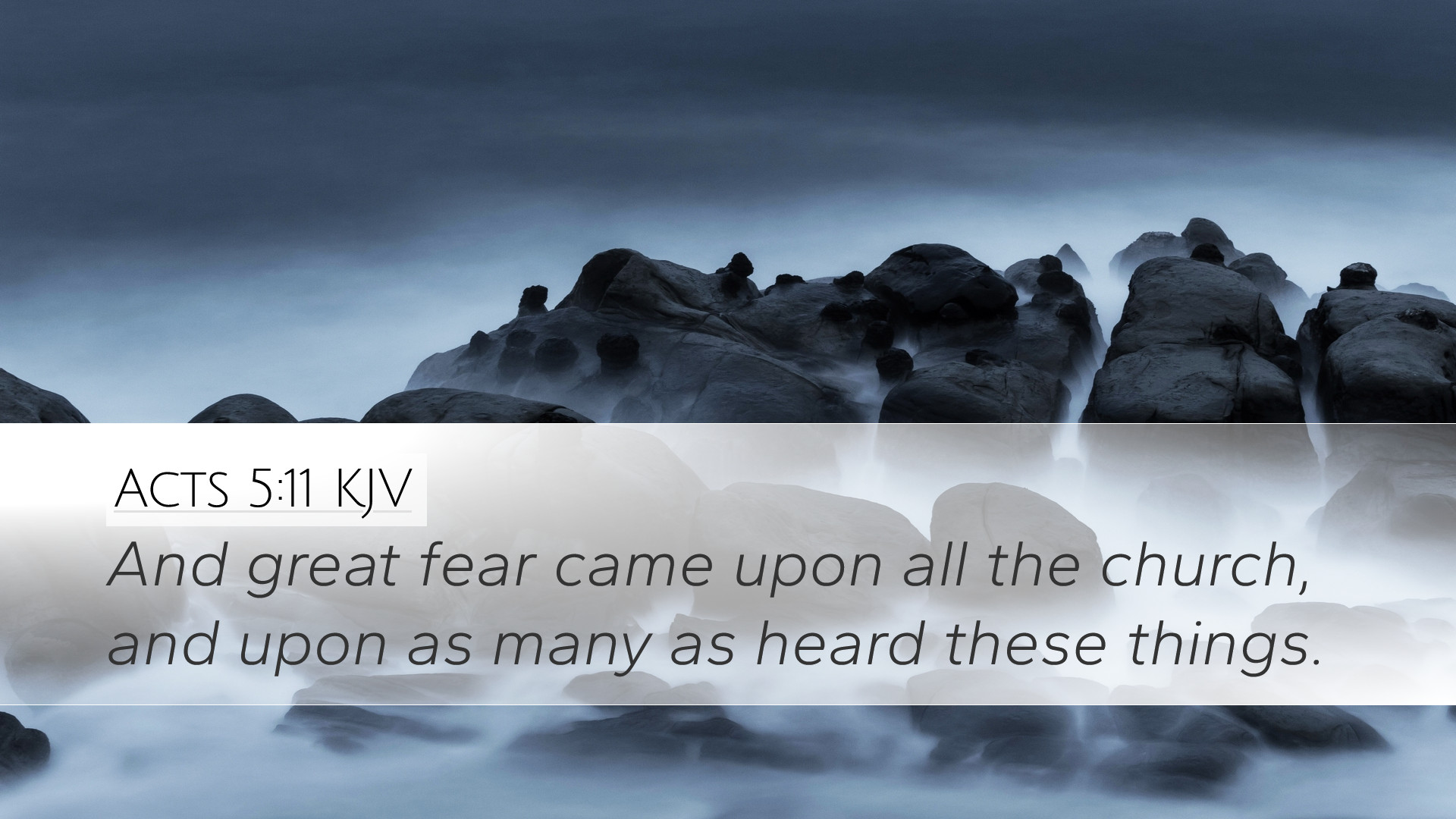Commentary on Acts 5:11
Verse Context: Acts 5:11 states, "And great fear came upon all the church, and upon as many as heard these things." This verse follows the account of Ananias and Sapphira, who lied to the Holy Spirit and subsequently faced divine judgment. This profound incident served as both a warning and an affirmation of the seriousness of sin within the early church.
Introduction
This commentary explores the implications and insights arising from Acts 5:11, drawing from the works of esteemed public domain commentators like Matthew Henry, Albert Barnes, and Adam Clarke. The verse encapsulates the atmosphere of reverence and trepidation that enveloped the early Christian community in response to God's judgment. The fear described here is multifaceted, impacting the church internally while also influencing external perceptions.
Theological Implications
1. Fear of the Lord: The "great fear" signifies a deep reverence for God that promotes holiness within the community. Matthew Henry notes that this fear is akin to awe and reverence, essential for a genuine relationship with the Almighty. It encourages the church to live righteously and illustrates the dangerous consequences of transgressing God's commands.
2. Divine Justice and Accountability: Both Albert Barnes and Adam Clarke emphasize the importance of accountability before God. The death of Ananias and Sapphira serves as a stark reminder that God observes the heart and intentions of His followers. The commentary suggests that this incident solidifies the idea that believers are accountable to God for their actions.
3. Community and Church Discipline: This event led to a collective sense of fear among the community, highlighting how individual actions can influence the wider assembly of believers. Matthew Henry suggests that such occurrences promote church discipline and encourage members to strive for holiness, contributing to a stronger, united faith community.
Historical Context
This verse is situated in a period of rapid growth and expansion of the early church. The apostles performed numerous signs and wonders, creating a notable contrast with the severe judgment experienced by Ananias and Sapphira. The fear that gripped the early church was not simply fear of punishment but also a recognition of God's presence and power among them.
Community Response
- Enhanced Reverence: The narrative indicates that the awe inspired by divine judgment caused believers to approach God with a deeper sense of reverence, as discussed by Adam Clarke.
- Missional Impact: The fear and awareness of God's power likely drew more people to the faith, understanding that this community was serious about holiness.
- Reflection on Sin: The incident prompted self-reflection among church members, encouraging them to examine their hearts and motives in light of God's standards.
Practical Application for Today’s Church
Acts 5:11 offers vital lessons for contemporary believers and church leaders:
- Promoting a Culture of Holiness: Churches should foster an environment where holiness is revered, and sin is taken seriously. Matthew Henry emphasizes that understanding God's nature can guide believers toward righteous living.
- Encouraging Transparency: The story of Ananias and Sapphira serves as a caution against hypocrisy. Leaders can encourage open confession and vulnerability, acknowledging that all fall short of God's glory.
- Celebrating God’s Sovereignty: As fear came upon the congregation, it is essential for the church today to recognize God's sovereignty in all matters, inviting a sense of deep worship and adoration.
Conclusion
Acts 5:11 encapsulates profound truths about God's holiness and His judgment. It calls for a serious contemplation of the nature of sin and its consequences while simultaneously affirming the necessity of a respectful fear of God in a believer's life. By reflecting on the insights provided by Matthew Henry, Albert Barnes, and Adam Clarke, church leaders and theologians can gain valuable perspectives that encourage a faithful and powerful witness in today's world.


